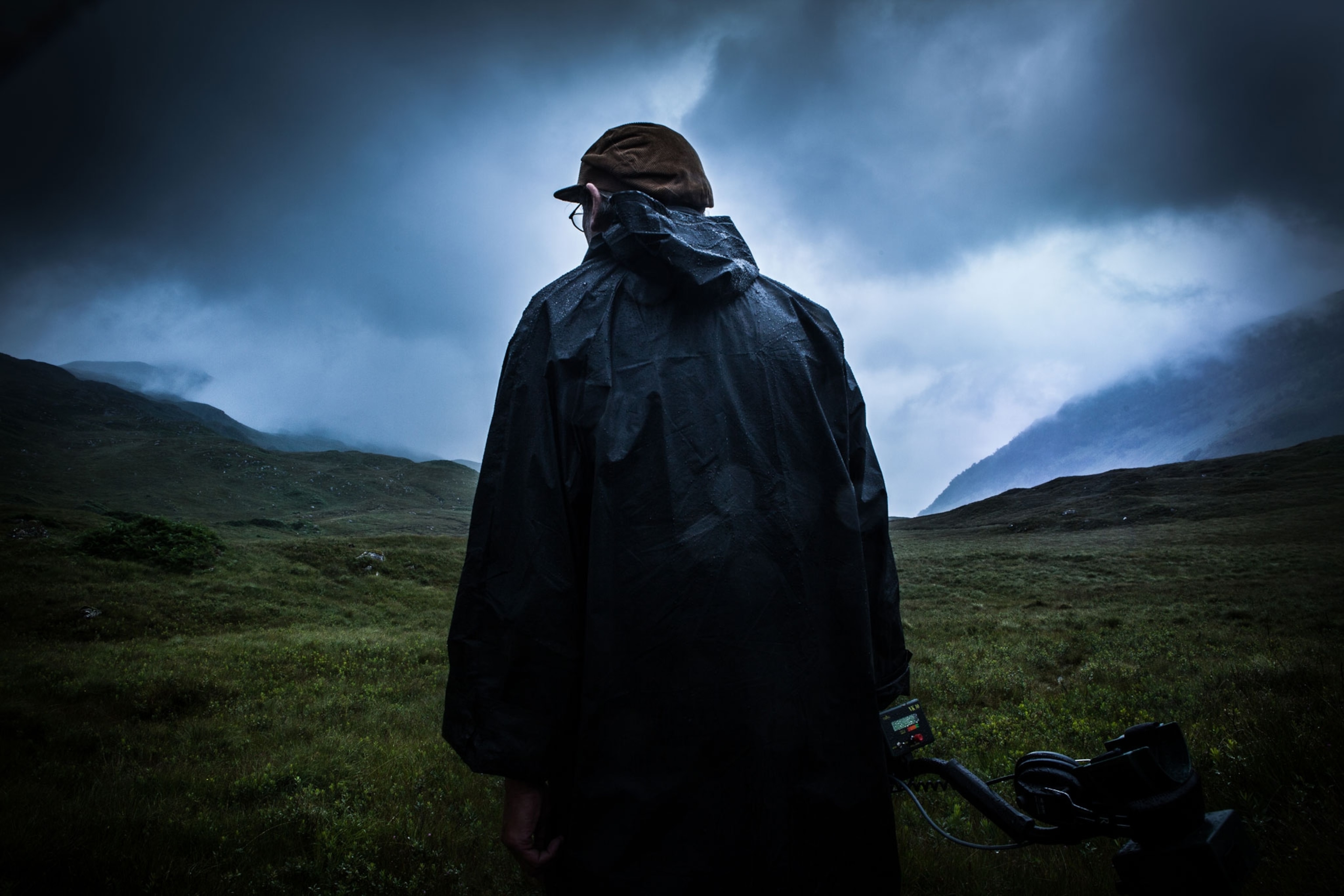
Searching for Buried Treasure in the Scottish Highlands
A new documentary chronicles an amateur explorer as he attempts to find a chest of 18th-century gold.
In 1990, amateur adventurer Garnet Frost nearly died while hiking through the Scottish Highlands. Before his miraculous rescue, he stumbled upon a mysterious staff—a walking stick stuck in a rock—which he came to believe signified the burial point of a long-lost treasure.
Twenty-two years later, on nothing but a fanciful hunch, Frost journeyed back to Loch Arkaig, where legend tells of a buried chest of gold that the French had planned to send to Prince Charles Edward Stuart (aka Bonnie Prince Charlie) in 1746. Along with his friends and some homemade hunting tools, Frost would attempt to justify his life’s worth by tracking down the fabled gold. Though he would ultimately prove unsuccessful, Frost was able to find a different sort of meaning in his quest.
Documentarian Edward Perkins, in his feature film debut, tagged along to capture Frost’s efforts for the BBC’s Storyville documentary series. The resulting film, Garnet’s Gold, recently opened in U.S. theaters and has aired on British television. Perkins, a former development executive at the National Geographic Channel, spoke to National Geographic from his London home about following Frost from a pub to the desolate wilderness, reconciling history with mythology, and what the two of them were really searching for.
Garnet isn’t a scientist, he’s not a professional explorer—he’s more of a troubadour. Tell me a bit about his background and why you were drawn to make this movie about him.
I think “troubadour” is an apt description of him. Garnet has lived all his life in London. He’s one of those old English eccentrics who has spent a lot of time out in his garden shed coming up with inventions. I first met Garnet in a pub—like a lot of good things that happen in England, this started in a pub. I was 24 years old; I was looking for my first feature documentary story. One of my colleagues told me about how, the night before, he’d met this extraordinary man in a pub who, in between singing old English songs, was regaling some of his friends with stories of lost gold up in the Highlands, and how he was going to find this gold. That immediately piqued my interest.
I went to meet Garnet, and over a couple sessions in a pub we got to know each other and I was allowed into his world. I met him and his mother and his group of friends, and they live an extraordinary, artistic life full of arts and lyricism and poetry. You go into their house and there are books stacked everywhere and beautiful bits of artwork that they’ve painted on the walls. It felt like a world that I’d never seen before, and it was enticing and intoxicating. The more time I spent with Garnet, the more I became swept up in his adventure and his desire to go to Scotland.
Let’s walk back a bit. What exactly happened on Garnet’s first voyage and how did he survive?
As he tells it, he went to Fort William, which is in the northwest of Scotland. He climbed up one of the mountains above the town and looked out toward the ocean, and he decided he would walk, in a straight line pretty much, across to the ocean on the west coast, out toward the Isle of Skye. He didn’t pack a tent or many provisions or rations—I think he had a loaf of bread and some cigarettes. And he just headed off, and quickly found himself quite lost and cold and alone and hungry, and on the edge of Loch Arkaig. And he didn’t know where he was, and he had resigned himself, I think, to die. The Scottish Highlands are a very, very barren, open place, and it’s very easy to get lost up there. It has a magical quality but it’s bleak and it’s brutal. For whatever reason, Garnet found himself in that position.
That’s where he found this staff, this wooden stick, embedded in this rock in the stream. And it’s that stick that he took back with him as a memento for his journey, and it was that stick which has inspired this return, because he believes the stick is an X-marks-the-spot, a marking place for the gold.
But how did he actually get out?
He was waiting for hours and hours on the side of this loch, and eventually, totally out of the blue and by complete chance, a small fisherman’s boat appeared on the loch. And he tied his shirt around this staff and started waving his shirt round and round and screaming on the edge of the loch. And luckily this fisherman saw him and came to pick him up and took him to the other side of the loch and back to safety. We were there for a good 10 days, and I never saw a boat. I didn’t see any human being up on that loch at all. I think he was just lucky.
I didn’t want to go into every detail about, well, why didn’t you just retrace your steps, or why didn’t you try and swim across the loch? I didn’t want to force him to try to explain everything, because over the years your memory does strange things, and it kind of became this tale for him. I don’t doubt for a second that it is true, but I wanted to embrace the mystical quality of this story as a launchpad for him going back out there.

This staff that he found he believes has historical significance dating back to the time of Bonnie Prince Charles. What leads him to believe this? Are there archaeological clues?
Not as far as I know. In one scene that we didn’t include in the film, he cut the staff in half, to try to date it by rings or carbon dating. That never came to fruition. But it wasn’t the nature of the film to start digging into the scientific or historical analysis of whether it was possible for this staff to have been from that era. It was part of the story that he’d started to tell himself and his friends. One of the other subthemes of this film is that sense of wish fulfillment and the sense that you can become swept up in the magic nature of a quest like this.
But it’s such a strange thing to leap to—that it would be not just an old staff, but specifically a staff from 1746.
There has been quite a lot of historical analysis on this lost gold, and it’s a treasure that a lot of people have searched for. Garnet did a lot of research, in two or three books, and those books, essentially, are historical books of what happened after the Battle of Culloden, where that gold was last seen, where it was taken to, and where Bonnie Prince Charlie was all those days. And Garnet essentially used that history as a treasure map and tried to pinpoint, based on the clues from the book, where Bonnie Prince Charlie must have been. He felt like this stream, this beach, on the south side of this loch, was a realistic hiding place for the gold, and therefore felt like this staff that he’d found may in fact be a marker for the gold. There are, in the book, passages that talk about stones and rocks and rivulets, and that’s the moment when he felt that the staff had more symbolic importance than just a stick.
You were following an amateur explorer on a 20-year-old hunch for a nearly 300-year-old artifact that has never been found …
When you put it like that, it sounds like a rather far-fetched idea. [Laughs] I was less interested in the history of the gold and more interested in the deeper psychological reasons for why Garnet wanted to go on this quest.
Did you see it more as you wanting to find something at the end, or more that you were fulfilling his psychological need to search for something?
I didn’t feel like I was fulfilling it, but I felt like he wanted to go back up to Scotland to fulfill it. In the film we talk about Garnet being a man who has many ideas, many great ideas, but they’ve all sort of fizzled out—none of them have ever come to anything. By dint of the fact that Garnet was being filmed by me, that someone had showed a real interest in him, his life, his adventure, wanted to document it, I think that did give him added motivation for this project not to be one of those ones that just fizzled out. But he did get back to Scotland, he made it work, he made it reality.
So did you think you would find something?
I was never sure. I know this is an easy thing to say, but it didn’t bother me either way. I didn’t go up to Scotland expecting us to find a load of treasure. But to be honest, given what kind of person Garnet is, I genuinely wouldn’t have been surprised if we had stumbled across a load of treasure and he’d been right all along.
This interview has been condensed and edited.
Andrew Lapin is a film critic and journalist who has written for NPR, Vulture, the Washington Post, the Atlantic, and many other publications. Follow him on Twitter.